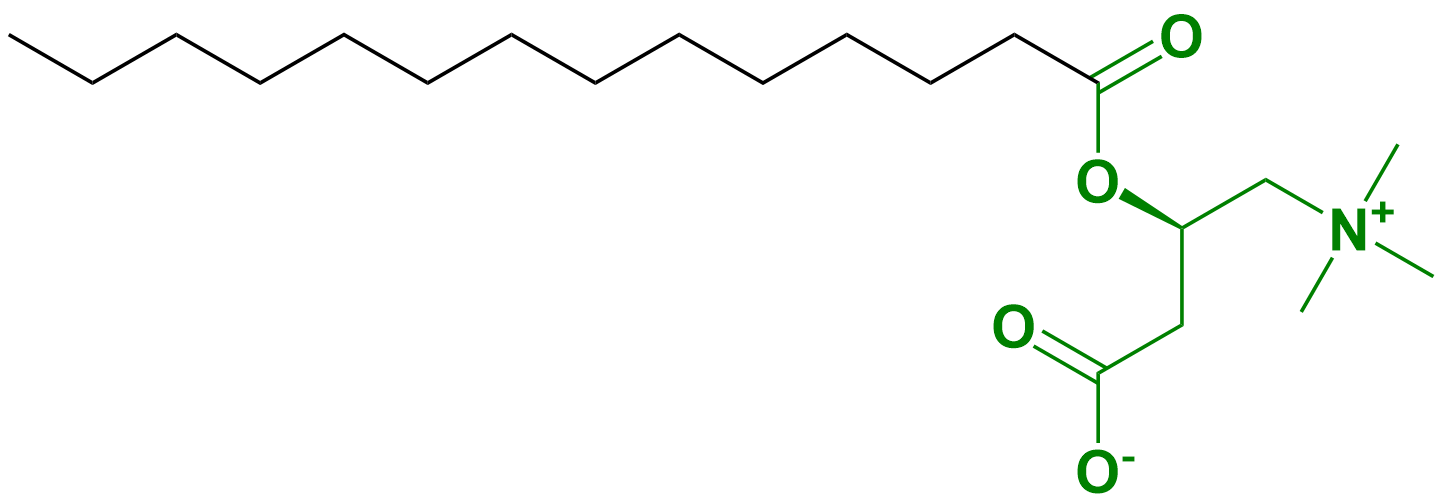Myristoyl-L-Carnitine Analysis Service
- Discovering new disease biomarkers
- Enhancing disease diagnosis
- Accelerating the discovery of novel therapeutics
- Unearthing new insights into disease mechanisms
- Animal tissue ≥ 100 mg
- Plant tissue ≥ 200 mg
- Serum/ Plasma ≥ 200 μL
- Urine ≥ 2 mL
Myristoyl-L-carnitine is one of the acylcarnitine derivatives, formed by the acylation of L-carnitine with myristic acid (C14:0). Its molecular formula is C21H41NO4, and structurally it consists of a 14-carbon saturated fatty acid chain (myristic acid) connected to the carnitine group via an ester bond. Under normal conditions, myristoyl-L-carnitine is a typical product of fatty acid oxidation. However, certain metabolic disorders or genetic diseases, such as carnitine palmitoyltransferase deficiency and fatty acid oxidation disorders, may lead to the accumulation of myristoyl-L-carnitine, which can disrupt normal lipid metabolism and cause metabolic diseases or cardiovascular issues. Excessive accumulation of myristoyl-L-carnitine is often associated with lipid metabolism disorders and an increased risk of cardiovascular diseases. Studies have shown that it may be linked to pathological conditions such as myocardial hypertrophy, fatty liver, and diabetes. Additionally, as an intermediate product of lipid metabolism, myristoyl-L-carnitine is also utilized in metabolomics research for the detection of disease biomarkers, providing insights into the fatty acid metabolism status in body fluids or tissues.

Figure 1. The Structure of Myristoyl-L-Carnitine
Using advanced techniques such as high-performance liquid chromatography (HPLC) and mass spectrometry (MS), the levels of myristoyl-L-carnitine in urine, plasma, or tissues can be measured to aid in the early diagnosis of lipid metabolism-related diseases, such as fatty acid oxidation disorders, metabolic myopathies, and certain types of cardiomyopathies. MtoZ Biolabs is proud to introduce its state-of-the-art Myristoyl-L-Carnitine Analysis Service, empowered by our advanced liquid chromatography-mass spectrometry (LC-MS) and a dedicated team of metabolomics experts. Our service offers comprehensive analysis of myristoyl-L-carnitine, ensuring high sensitivity and precision.
Analysis Workflow
Service Advantages
1. High Sensitivity and Accuracy
MtoZ Biolabs' liquid chromatography-mass spectrometry (LC-MS) analysis platform can detect extremely low concentrations of myristoyl-L-carnitine and its metabolites, which is particularly important for studying their minute changes in cells, tissues, and bodily fluids.
2. High Specificity
By optimizing chromatographic separation conditions and mass spectrometry detection parameters, myristoyl-L-carnitine and its various metabolites can be effectively distinguished in complex biological samples, minimizing interference from other endogenous or exogenous substances and improving detection specificity.
3. Customized Analysis
Tailored analytical solutions can be designed according to research needs, providing personalized solutions for different biological samples and target molecules.
Applications
Sample Submission Requirements
1. Sample Types
Serum, plasma, urine, tissues and other biological samples. A minimum of 3 samples of the same type should be selected for each analysis.
2. Sample Volume
3. Sample Preservation
Samples should be stored at -80°C to maintain stability.
Note: Please provide detailed information about sample collection and handling.
Deliverables
1. Experimental Procedures
2. Relevant Liquid Chromatography and Mass Spectrometry Parameters
3. Detailed Information on Myristoyl-L-Carnitine
4. Raw Data
5. Custom Analysis Report
Our aim is to support your research and product development by providing accurate and reliable results through our myristoyl-L-carnitine analysis service. If you are interested in our related services, please feel free to contact us.
How to order?







